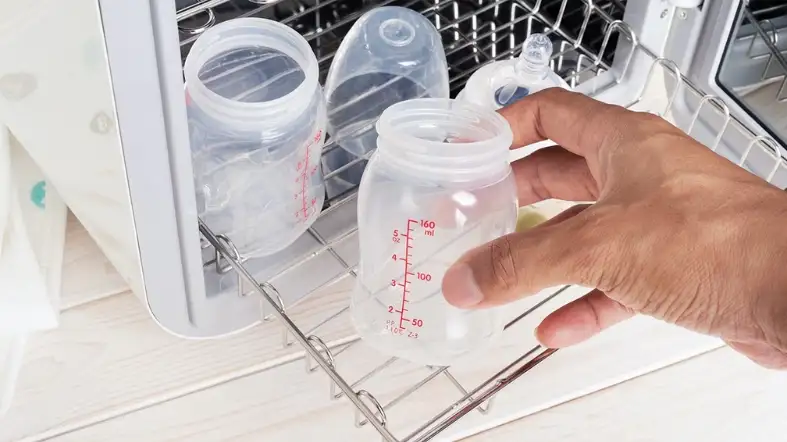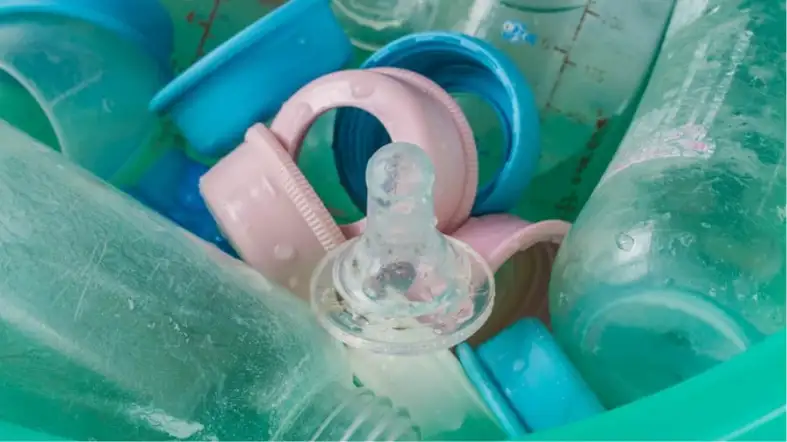Discover the truth about using Dawn Dish Soap for cleaning baby bottles. In this article, we’ll explore the safety aspects, the benefits, and potential risks involved. Find out the proper methods to ensure your little one’s feeding equipment remains clean and safe. Let’s dive in!

Is Dawn Dish Soap Safe For Cleaning Baby Bottles?
Dawn dish soap is generally considered safe for handwashing baby bottles by health experts. Dawn’s formula is designed to cut through grease, break down milk proteins, and eliminate bacteria without leaving a soapy residue when rinsed thoroughly.
According to Dawn’s website, their dish soap can be used to safely handwash baby bottles.
The soap helps remove milk fat and protein residues. Importantly, Dawn won’t leave behind suds or residue if the bottles are rinsed well with hot water after washing.
Dawn’s safety and efficacy for cleaning baby bottles is backed up by various parenting sites and forums.
For example, My Miracle Baby notes Dawn is commonly used for cleaning baby bottles without issues. BabyCenter community members also share positive experiences using Dawn for handwashing bottles.
So in summary – yes, Dawn dish soap is generally regarded as safe for washing baby bottles as long as you properly rinse away any suds and residue after cleaning.
Understanding Dawn Dish Soap Ingredients for Baby Bottle Cleaning
To understand why Dawn dish soap is considered safe for baby bottles, let’s look at its ingredients and how they work:
Surfactants Break Down Residues
The active cleaning ingredients in Dawn are surfactants, like sodium lauryl sulfate.
Surfactants lower the surface tension of water to cut through grease and food residues – like milk fats and proteins dried on bottle interiors.
Several clinical studies have confirmed the safety and non-toxicity of sodium lauryl sulfate. This allows Dawn to break down stubborn milk residues without using harsh chemical ingredients.
Chelating Agents Soften Mineral Deposits
Dawn contains chelating agents like tetrasodium EDTA. These ingredients latch onto hard mineral residues in water, softening them so they can be rinsed away.
This helps remove any mineral deposits left behind from tap water, making bottles cleaner. The amounts of chelators in Dawn are low and not a health concern.
Perfumes and Dyes
Like most soaps, Dawn contains added perfumes and dyes to give it a pleasing scent and blue color. The dyes and fragrances are rinsed away with the suds, leaving no residue.
Still, some parents may prefer to avoid these cosmetic additives. Dawn does offer fragrance-free dish soap options without dyes.
No Antibacterial Agents
Some dish soaps contain antibacterial chemicals like triclosan. However, Dawn dishwashing liquid does not contain any added antibacterials.
This makes it safer for cleaning baby bottles, as antibacterial agents can interfere with immune system development. Dawn’s formula relies just on surfactants and chelators to remove residues and bacteria.
Thorough Rinsing Removing Residues
While Dawn’s ingredients are safe, it’s still important to rinse bottles thoroughly after washing.
This prevents any soap residues from remaining on the bottle that could get into breast milk or formula.
As long as bottles are rinsed well with hot water, especially crevices, Dawn won’t leave any suds behind according to the product labeling. Proper rinsing helps ensure no inadvertent exposures.
Risks and Precautions: Using Dawn Dish Soap for Baby Bottles

While deemed safe if used properly, there are some precautions parents should keep in mind when using Dawn for baby bottles:
Possible Skin Irritation
Dawn dish soap can sometimes cause skin irritation with prolonged direct exposure, due to ingredients like fragrances.
It’s best to avoid using bare hands when washing bottles with Dawn. Instead, use a bottle brush, sponge, or gloves to minimize contact time with skin. Rinse hands after washing.
Allergies and Sensitivities
In rare cases, infants may be allergic or sensitive to certain ingredients in Dawn, like added fragrances. Discontinue use if any signs of skin irritation or allergy develop.
For babies with known sensitivities, fragrance-free Dawn or plant-based soaps may be better options. Consult a pediatrician if concerns arise.
Accidental Ingestion
If too much Dawn residue is left behind after washing, an infant could inadvertently ingest some soap. This is why thoroughly rinsing bottles is vital.
Caustic injury or upset stomach could occur if soap enters the mouth. Always inspect bottles carefully before each use. Discard any with visible suds left behind.
Following proper safety steps when washing and rinsing helps make the risk of reactions very low for most infants. But any concerns about using Dawn should be discussed with a pediatrician.
How to Properly Clean Baby Bottles with Dawn Dish Soap

Here are some best practices for safely washing baby bottles with Dawn dish soap:
1. Take Bottles Apart
Take apart all bottle pieces – nipples, caps, collars, discs, etc. Soap may get trapped in assembled bottle parts.
2. Use Warm Water
Wash bottles in warm, soapy water. Dawn diluted in warm water helps cut grease. Rinse with hot water.
3. Use Bottle Brush
Scrub inside bottles with a bottle brush to fully remove residue. Get into crevices. Avoid using bare hands.
4. Rinse Thoroughly
Rinse bottles well with hot water until all suds are gone. Inspect carefully for any trapped soap bubbles.
5. Air Dry
Let bottles air dry fully before reassembling to further evaporate any moisture. Don’t towel dry.
6. Sterilize
Consider steam sterilizing bottles after washing with Dawn for extra disinfection.
Following this process helps remove all milk and soap residues so bottles are safe for the baby.
FAQs About Using Dawn Dish Soap for Baby Bottles
Is it better to use plant-based dish soap for baby bottles?
Some parents prefer to use plant-based or organic dish soaps marketed for babies and children.
However, Dawn is still considered safe if rinsed well.
Does Dawn remove all milk proteins and bacteria?
Yes, when used properly the surfactants in Dawn help eliminate milk fat, proteins, and bacteria from bottles.
Can Dawn be used on plastic and glass bottles?
Dawn is safe for washing plastic and glass baby bottles. It won’t damage materials when directions are followed.
How often can you wash bottles with Dawn?
Bottles can be washed with Dawn as needed at each use. There is no limit on frequency as long as rinsing is thorough.
Is Dawn fragrance-free soap safer for baby bottles?
For babies with sensitivities, Dawn’s fragrance-free formula may be preferable.
But standard Dawn is still considered low-risk if rinsed well.
Conclusion
While some families may prefer plant-based cleaners, Dawn dish soap can be safely used for cleaning baby bottles with proper precautions.
Its surfactant-based formula helps cut through dried milk residues without leaving behind soap residue when bottles are rinsed thoroughly after washing.
Following best practices for dilution, washing methods, and rinsing helps ensure Dawn effectively cleans bottles while minimizing any risks for babies.
Consult a pediatrician if any concerns arise when using Dawn for bottle cleaning.

